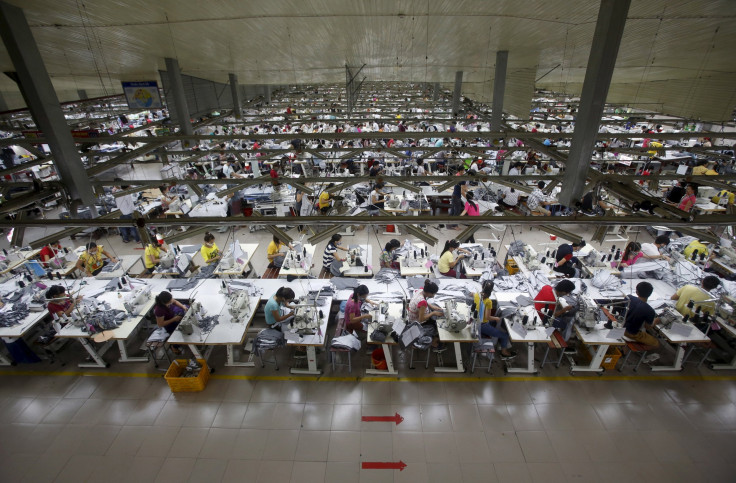After Trans-Pacific Partnership Text Released, Labor Advocates Say Human Rights Protections 'Not Enforceable'

Labor advocates and Democratic politicians said Thursday that worker protections and labor standards included in the newly released text of the Trans-Pacific Partnership (TPP) trade deal would not be enforceable. The full text of the agreement, which had been kept secret throughout years of negotiations, was released early Thursday morning, marking the real start of President Barack Obama’s battle to sell the deal in Congress.
The White House has touted the trade agreement as good for workers, and promised the full text of the 30-chapter deal would address concerns over the inclusion of countries known for human rights violations. It is hoping the labor protections included in the TPP, as well as separate human rights agreements between the United States and Vietnam, Malaysia and Brunei, will convince some progressives to back the deal. But so far, Democrats remain skeptical.
The agreements laid out in the deal’s labor chapter require Vietnam, Malaysia and Brunei to meet certain criteria before they can access economic benefits from the TPP. For example, Malaysia has agreed to implement regulations combatting human trafficking and Vietnam must allow independent labor unions. Other provisions include requiring minimum wages and hours of work, maintaining or instituting labor protections and discouraging trade in goods made by forced labor.
“Without reservation, I think this is the best opportunity we’ve had in years to encourage deep institutional reform in Vietnam that will advance human rights, and it will only happen if TPP is approved,” Tom Malinowski, the assistant secretary of state for democracy, human rights and labor, told the New York Times in an interview.
However, labor advocacy groups are not buying the government’s message so far. One provision in the labor chapter they particularly took issue with is that Vietnam -- one of the countries which stands to benefit the most from the TPP -- has five years to comply with labor standards before the United States can level sanctions against it.
#TPPWorseThanWeThought Vietnam gets 5 yr pass on having to meet some of the #TPP labor standard administration keeps touting?! #StopTPP
— Teamsters (@Teamsters) November 5, 2015In general, labor advocates say the ideas in the trade agreement might be moving in the right direction, but there is no guarantee they will be enforced. John Sifton, the Asia Advocacy Director for Human Rights Watch, told the New York Times that the bilateral agreement “is not enforceable in practice.” He said he does not trust the record of the Office of the United States Trade Representative, and so he would like workers to have the right to bring their problems to a settlement panel -- something corporations can do under the trade deal.
“Are trade unionists who actually produce all the capital that we’re talking about here allowed to bring complaints against a country for violations?” he asked. “No, of course not.”
Democratic lawmakers echoed these comments Thursday, expressing skepticism and disappointment in the deal as many took to Twitter using the hashtag #TPPWorseThanWeThought.
#TPPrevealed today w/no enforceable #TPP human rights rules, includes human #traffickers Brunei, Malaysia & Vietnam. #TPPWorseThanWeThought
— Marcy Kaptur (@RepMarcyKaptur) November 5, 2015Democratic Rep. Rosa DeLauro of Connecticut has been one of the most outspoken members of Congress on the issue of the Pacific trade deal. She wrote a piece for the Hill before the full text was released, criticizing the agreement’s handling of countries such as Vietnam and Malaysia, where, she said, workers would be treated poorly.
As activists and lawmakers began to read through the trade deal Thursday, they promised they would continue fighting to stop its progress, even as Obama hopes to make this perhaps the last big fight of his presidency.
"The TPP is a disaster for jobs, and environment and our democracy. It is the latest stage in the corporate capture of our society,” Nick Dearden, the director of advocacy group Global Justice Now, said in a statement. "The good news is this can still be stopped. We’ll be doing all we can to support the huge swathe of trade unions, campaigners, activists and consumer groups in all those countries fighting TPP in the coming months."
Congress now has 90 days to read the TPP and make up their minds before Obama will sign the agreement, triggering the next stage in the process before final Congressional approval. He will likely need to rely on Republican votes, as many Democrats (including the Democratic presidential candidates) remain staunchly opposed to the deal.
© Copyright IBTimes 2024. All rights reserved.












